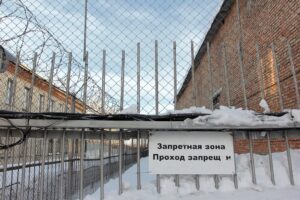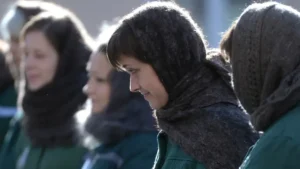Anna Zhavnerovich went to the police a week after she says her boyfriend beat her unconscious, determined to make sure he was arrested and brought to justice. She was surprised by some of the questions the Moscow police officers asked her when she recounted what had happened, her face still painfully swollen and discoloured.
“They asked me why I didn’t have any children,” she remembers. “They asked me if I was married.” Beneath their line of questioning was the suggestion that somehow the attack was her fault.
They told her that they would investigate, but a few weeks later she received a letter informing her that the case had been dropped. Her ex-boyfriend had not been questioned and no further action was proposed. When she tried to hire a lawyer to start a private suit, she was told that the police had lost her files.
Zhavnerovich, 28, a journalist at a fashionable Moscow-based online lifestyle website W-O-S, chose instead to write an article about what had happened to her. Its publication last month attracted huge attention, highlighting an issue that for decades has been an almost unmentionable taboo. Zhavnerovich was bombarded with hundreds of emails and Facebook posts from women who wanted to tell her that they, too, had been beaten up by partners and struggled to get the authorities to register a complaint.
“I think people were surprised to read that this was happening in young, fashionable Moscow circles – not something to do with alcoholics in some remote, backward village somewhere. That’s why it triggered such a huge reaction from the public,” Zhavnerovich said. “Judging by the responses I have had, the scale of the problem is enormous.”
The interest her account provoked chimed with a political shift in attitudes to this issue, which is finally edging towards the political mainstream. After decades of failed attempts to draft legislation that identifies domestic violence as a crime, politicians at the Moscow Duma hope this session of parliament to debate a new law, which will make it easier for victims to prosecute their attackers, and introduce a series of preventative measures, such as restraining orders and behavioural therapy for offenders.
Politicians have already considered (and abandoned) more than 50 draft versions of a law on domestic violence since the early 1990s, but this time there is muted optimism from campaigners, who say a series of high-profile cases are finally bringing this hidden issue into the open, strengthening demand for improvements in the way complaints from women are handled.
Advertisement
The current debates over how Russia deals with domestic violence reflect changing attitudes to women, in a country where family values remain conservative. It touches on a perplexing Russian paradox – that while the Russian government has long promoted equality in the work place, attitudes towards women remain patriarchal. The UN Committee on the Elimination of Discrimination Against Women, which was considering the issue of domestic violence, expressed concern in 2010 at the “state party’s repeated emphasis on the role of women as mothers and caregivers”.
“If he beats you, he loves you,” goes a well-known Russian proverb, a wry articulation of an acceptance that being hit by your husband is simply an everyday part of human relationships. Marina Pisklakova, head of ANNA, a Moscow-based charity which has been fighting for improved support for victims of domestic violence since the 1990s, points out that the violence itself is a global problem, but that Russia is unusual in having such inadequate legislation.
“We desperately need the legislation because when there is no legislation, it makes it look like this is something that is tolerated by society, so the legislation in itself will be a powerful statement that this is not something that is acceptable – and I think that will have an impact on behaviour,” she said.
Because there is no separate classification for domestic violence, there are no reliable statistics on prevalence, but the Ministry of Internal Affairs estimated in 2008 that it occurs in 25% of all families, and that 14,000 women die every year “at the hands of husbands or other relatives”, with nearly 65% of all homicides related to domestic violence.
“The reporting is very low. It is a very concealed issue,” Pisklakova said. “But things are changing; there is not as much denial as there was.”
President Vladimir Putin had indicated that he would support the bill, but elsewhere there has been hostility to the proposed legislation. A Russian orthodox archbishop, and Russia’s official children’s rights ombudsman, criticised groups campaigning on this issue in March, accusing them of disseminating “anti-family propaganda”. Pavel Astakhov wrote on his Instagram account: “The family is the safest place! Far more crimes happen in public places, on transport and in stores … Constant and excessive use of the term ‘domestic violence’ serves to intimidate families and parents.” He advised the government against Russia signing a Council of Europe convention on preventing domestic abuse, arguing that it would be against Russia’s “national interests”.
Currently, the only cases that get serious consideration from the police and the courts are those where the woman has suffered serious physical injuries or been killed. The onus is on women to file a case, but most lack the necessary legal expertise, let alone money for a lawyer. The system is so complicated that 90% of filed cases are dismissed for technical reasons, and only around 3% result in criminal convictions of any kind. Because a fine of 50,000 roubles (about £630) is the most likely outcome, police are reluctant to accept the bureaucratic work involved in processing a case, said Nikolai Levshits, who works with the charity Russia Behind Bars.
The UN’s special rapporteur on violence against women concluded in a recent report: “The lack of a specific law on domestic violence in Russia is a major obstacle to combating this violence.”
The emerging campaigns for improvement reveal the strength of the internet in empowering previously voiceless groups of people. Alyona Popova, an activist on this issue, whose change.org petition calling for legislation gathered 120,000 signatures within days of being launched, explains that she became involved after a friend’s boyfriend beat her violently. “After 24 hours, he visited her in hospital carrying a huge bunch of flowers and she responded by telling me: ‘He is perfect; he is my future. Perhaps this was all my fault.’ This is a powerful women, an entrepreneur who runs her own business, and her response was not unusual,” she said. “Most women don’t go to court. They feel shame; they blame themselves.”
She is concerned about the number of women in prison for murder, committed in self-defence. “They get no protection from the police, so in the end they take a vase and hit him on the head,” she said. This is an area little-studied in Russia. “No one has any interest in collecting these figures.”
Campaigning is beginning to break a taboo. When allegations emerged that the popular actor Marat Basharov had beaten his actress wife Katya Arkharova so violently last October that she was in a coma, the subject was widely debated on television. “When famous women start talking about it then things begin to change,” Popova said, but she is not certain that new legislation will pass. “Most of the deputies are men, and there’s a perception that these are family matters that should be dealt with in the family. I’m not that optimistic.”
Activist Alyona Popova is concerned about the number of women in prison for murder, committed in self-defence
In 2013, there were 43 shelters across Russia with beds for around 400 women – which represents just 3% of the total number of shelter spaces for women victims of violence recommended by the Council of Europe. But the Moscow government last year built a 35-bedroom, well-equipped complex for battered women, with facilities for therapy and psychological support for children – another clear sign that attitudes are changing.
Natalia Zavialova, head of the state-run centre, said of the 200 women who had stayed in the shelter over the year since it opened, only one had taken her case to court; the rest were unwilling to confront their former partners, or were simply overwhelmed by the difficulties of the legal process. But she senses the start of a shift in the seriousness with which the subject is treated. “People are beginning to talk about the subject more openly and have begun to understand that places like this are essential.”
Zhavnerovich said she wrote the article to help other women understand what they need to do if they are beaten by boyfriends or husbands. Written in the form of short diary extracts, the piece is her cool account of what happened to her, beginning with the night before New Year, when she and her boyfriend decided to split up after three years together. They agreed, calmly, that this was for the best, and went to sleep. At around 4am she awoke to find him screaming at her, and hitting her head with his fists. She regained consciousness, aware that blood was streaming from her face. It took her a while to decide what to do; when her boyfriend left the flat to go to the local pharmacy to buy antiseptic cream, she called a friend to come and rescue her.
Initially she didn’t want to approach the police, convinced it would be a useless exercise. Her friends offered, quite seriously, to go and take revenge with a baseball bat, also certain that there was little likelihood of a constructive response from an appeal to the police. After a week, still reluctant to leave her friend’s flat because her injuries were so horrific, she decided to at least try to register a formal complaint. She shows pictures on her iPhone of her face then, unrecognisable because of the injuries.
After her article was published, several lawyers offered their help, but even with discounts (offered in the hope that she would be writing about their services), she estimated that the bills would run up to about $10,000, equivalent to more than six months’ salary. “I’m in a well-paid job, but there’s no way I could afford that,” she said. “Besides that the whole process is so incredibly complicated, you would have spend all your time on preparing the case, collecting the documents, proving you were a victim, acting as a private detective and a lawyer … most women just don’t have the time or the skills.”
She was lucky in that eventually a lawyer agreed to take on her case pro-bono, and she thinks there will be a hearing within the next two months. She hopes that her ex-partner will get some kind of community-service sentence. “I’m not bloodthirsty, hoping for revenge, but I do want the case to go to court. At the moment, I am the one made to feel guilty.”
She has received such toxic abuse from online commentators that she no longer reads them, but there has also been support; and within days of publication the article became the most read article in the website’s history. “Women have been emancipated since the Soviet Union, but they have never been feminists; that movement is beginning now,” she said. Zhavernovich is happy to have helped drag the subject out of the shadows. “This was such an unmentionable subject. It was always there but no one ever talked about it. I felt I had a responsibility to tell people about what happened to me.”
Источник: The Guardian







